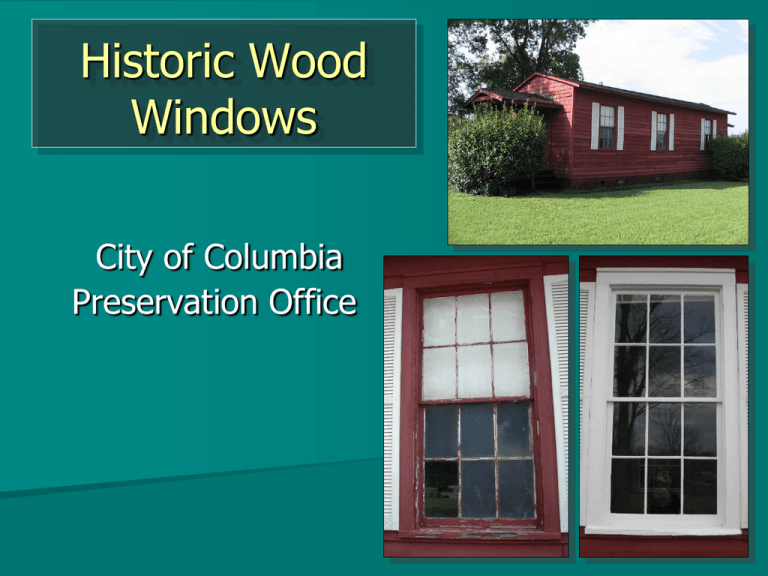Historic Wood Windows City of Columbia
advertisement

Historic Wood Windows City of Columbia Preservation Office TOPICS Windows and Design Functions and Characteristics of Windows Repair and Renovation Replacement Window Myths Energy Efficiency Tips Windows help make the style of the building "The history of architectural material... has been the endless struggle for light... in other words, the history of windows." - quote attributed to French architect Le Corbusier DURABILITY & CRAFTSMANSHIP Glass and wood came in different grades, the lesser the grade, the more blisters or lines were in the glass and the more knots were in the wood. Virgin timber could have as many as 30 growth rings per inch, versus the 3 to 5 growth rings per inch of modern timber. (J. Stahl, This Old House) Above: Curtis Window pamphlet, 1927 (archive.org) Left: Wood Window Repair Handbook, Landmark Consulting How Do Historic Windows Work? The wood and glass in old windows and doors is generally very sturdy, repairable, and can last for generations if properly protected. The parting beads, check rails and stops are meant to secure the sashes tightly in the jamb, these were often custom installed on site to ensure a good fit. Why Don‟t Mine Work? Common Problems With Historic Wood Windows and Doors: Symptom Problem Solution Can‟t open window Painted shut Score painted joint with blade or window zipper Window won‟t stay open Ropes cut Replace with new rope, or add new hardware Putty is crumbling or missing Putty is past its lifespan Remove old putty and add new putty Broken glass Broken glass Remove putty and glazier points, replace glass Loose corner joints in sash Shrinking of wood, loss of wood dowel holding joint Tighten joint with wedge or new wood dowel and glue Peeling paint, soft wood Moisture and/or rot has attacked the window through rain or condensation Remove paint, consolidate wood, epoxy missing components or add wood Rattling, drafty windows Sash is loose in jamb Add spring bronze weatherstripping or build up jamb as needed Repair and Renovation Michael J. Devonshire, Repairing Old and Historic Windows, NY Landmarks Conservancy Windows should be considered significant to a building if they: 1) are original, 2) reflect the original design intent for the building, 3) reflect period or regional styles or building practices, 4) reflect changes to the building resulting from major periods or events, or 5) are examples of exceptional craftsmanship or design. (From the National Park Service, Preservation Brief 9: The Repair of Historic Wooden Windows) Step 1: Assess condition of windows for significance, appearance, operability and soundness Step 2: Set a goal for restoration, simple repair, rehabilitation or preservation Step 3: Follow lead safety procedures. Test materials and follow guidelines of the Environmental Protection Agency. Step 4: Either remove windows or work on windows in place. TIP: Use the Secretary of the Interior‟s Standards for Rehabilitation DIY Wood Window Restoration Restoration Steps: 1. 2. Vertical piece is the “stop” Some images from Don Browers, Old House Mechanic, 2009 Window Repair presentation At left: Image of window weights from David Hoggard, DoubleHung Restoration, LLC Break paint seals using window zipper Remove “stop” on one side of the window, remove bottom sash and remove rope, if attached. Label sashes as you remove. 3. Remove parting bead to remove the top sash, remove rope if attached. 4. Remove old paint*, if necessary, and putty (steam, scrape, chemical, heat) 5. Brush on boiled linseed oil (caution: combustible) into muntins and other exposed wood. Oil is a water repellant, but may attract mildew. 6. Repair any rotted wood, loose corners, missing muntins and replace glass. 7. Apply a wood preservative, if necessary. 8. Replace putty. 9. Paint only those areas that are exposed. Use painter‟s tape! Wax bare wood if necessary. 10. Install new ropes. 11. Add weatherstripping. 12. Reinstall sashes. *Follow EPA guidelines for possible leadbased paint! Quick Repairs, Full Restoration, Replacement? At Right: A loose corner is tightened by hammering in a small, tapered shim beside the tenon Below: A rotted corner is consolidated and then filled with epoxy Below Right: A missing rib on a muntin is replaced with a piece from a salvaged window Advanced Window Conservation For advanced repairs you may consider wood consolidation and epoxy, Dutchman wood repairs, or replacing muntins, stiles, or rails. Used Abatron wood repair system. Other products are from West Systems, Sculpwood from System 3, and Flext-Tech epoxy from Advanced Repair Technology. Absolutely beyond repair? Are you sure? Replacement wood sashes with true divided lights and putty available from Victor-Bilt, a window company started in 1944 and based in Greenville, S.C. Some images at right provided by David Hoggard of DoubleHung Restoration, LLC. People Say: I have to replace my windows because of energy efficiency! Ok, let‟s see…. Window Replacement Myths Calculator from vinyl window company website suggests that my energy loss through existing windows is 30% of my energy bill. Calculator suggests that I will now have no energy loss through my new windows! U.S. Dept. of Energy Average monthly energy bill = $200 If windows account for 10% of energy loss: 10% of bill = $20 per month If new windows double the efficiency of your windows, accounting now for only 5% of energy loss, you‟ve saved $10 per month If the windows cost $3,000, it will take 300 months, or 25 years to recoup your cost. Most vinyl windows last less than 25 years as the PVC used to make them degrades in sunlight. “In a warning to marketers, the Federal Trade Commission today settled charges with five companies that claimed energy-efficient replacement windows could save consumers „up to‟ 35 to 55 percent in heating and cooling bills. The FTC found that „most customers could never achieve these kinds of results.‟ Overall, he estimated that the average true savings on energy bills as a result of new windows is more like 5 to 20 percent. „We‟re not claiming these are bad windows,‟ he said. „They just overstated the energy savings.‟” (February 2012, J. Greene) Window Replacement Myths GREEN! Match historic appearances No Maintenance Appropriate for any building Cheaper than repair Wholesale replacement is best Just replacing the sash-not the window! “Old windows won‟t ever work right” Reality Adds millions of pounds of waste to our landfills Vinyl windows are generally not recycled Muntins (vinyl and wood) are too wide and often too flat New wood windows are often fast growing Ponderosa Pine, which is susceptible to rot and insects Cannot be maintained because once vinyl parts start to fail or break you often have to replace the entire unit. Limited colors, white and white Repairs can be much cheaper on historic windows Usually not all windows in a building have the same level of disrepair Installation can affect energy savings A 2004 Fine Homebuilding Magazine article disclosed that about 30% of windows being replaced are less than 30 years old, “which is shocking compared to windows constructed 100 years ago that continue to perform with just a little maintenance.” FHB, 2011, Aaron Lubeck Sustainability Initiative Brochure from Marvin Windows and Doors. Energy Efficiency and Old Windows Windows are big holes in the walls. Air will go around them, heat can transfer through them. Add layers to windows to create an air space: use blinds, shades, drapes, shutters, or energy-efficient storm windows. Allow for weep holes with storm windows! Do not laminate old glass! Consider awnings for appropriate buildings. Add Low-E film to existing storm windows. Add weatherstripping along sashes to stop air. Try spring bronze or even inexpensive V-crimped vinyl. Caulk around window trim. (Latex caulk so it can be painted!) Caulk in the window weight pocket, if possible. Add a filler to the bottom of a pulley. Make sure putty around the panes is intact, or replace. Add hardware to ensure that the meeting rails fit tightly together. For One Window: Bronze Weatherstrip kit $11 Window Putty (with leftover) $17 Caulk for interior and exterior $3 Cellular Shade $30 TOTAL is less than $61 Maintaining and upgrading your historic windows with the above items can make your windows almost exactly as energy efficient as new vinyl replacements. Left: Aluminum storm windows painted the same as the sashes disappear from view Right: Interior magnetic storm windows can be easily removed Wood Window Preservation Points Contribute to architectural style Created to work easily and to last a long time Lack of maintenance will affect performance and lifespan Restoration takes TIME, but lasts for DECADES Vinyl window marketers need to be on “Myth Busters” Old windows can be made energy efficient It is sustainable and “green” to restore and reuse historic windows There is a finite amount of historic windows and more are being lost every day Education is key! Want to Learn More? Before and After of restoration of windows from 1867 Youtube videos online: Simple Steps to Working Windows (Kalamazoo), Kansas SHPO National Park Service Preservation Brief 9 National Window Preservation Standards (book) Old House Journal, various issues “The Repair of Wood Windows,” SPAB “Save Our Historic Windows” John Leeke Repairing Old and Historic Windows, New York Landmarks Conservancy Staci Richey SLRichey@columbiasc.net 803-545-3328 Before and After of restoration of windows from 1867


